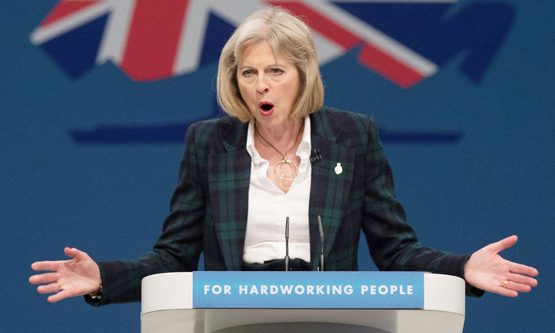On 16 October, in a perverse twist of politics, Conservative Home Secretary Theresa May was acclaimed as a national hero and defender of liberal values, as she announced that British citizen Gary McKinnon would not be extradited to the US to face charges of hacking into government computers. The press, from the Daily Mail to The Observer, sycophantically lauded her and the Director of Liberty Shami Chakrabarti gushed: ‘This is a great day for rights, freedoms and justice in the United Kingdom. The Home Secretary has spared this vulnerable man the cruelty of being sent to the US and accepted Liberty’s long-standing argument for change to our rotten extradition laws.’
May’s decision not to send McKinnon, who has Asperger’s syndrome, to be imprisoned in the US, was in itself welcome news (for everyone other than former Labour Home Secretary Alan Johnson, who continued to argue loudly that McKinnon should be extradited) and a victory for his mother Janis Sharp, who had campaigned tirelessly for her son for ten years. However, the timing of Gary McKinnon’s reprieve and the accompanying announcement that future extradition arrangements would include a process whereby British courts can decide whether a person sought by another country should stand trial here instead, clearly demonstrated that May and her government, far from deserving accolades for their humanitarianism, are a bunch of callous, hypocritical racists.
Just 11 days earlier, on 5 October, after years of legal battle, two other British citizens accused of computer related offences, Talha Ahsan and Babar Ahmad, were among five men extradited to the US.* They are now being held in solitary confinement in a Connecticut prison and their trials have been scheduled for October 2013. Like Gary McKinnon, Talha Ahsan, who had never previously set foot in the US, has Asperger’s syndrome. Unlike Gary McKinnon, who was on bail all the time since his indictment in 2002, Talha and Babar had been detained in Britain in high security prisons ever since their arrests in 2006. Most crucially, unlike Gary McKinnon, they are of Asian descent and are Muslims.
Theresa May has been Home Secretary since the ConDem government’s election victory in 2010. In following on from a series of viciously anti-working class, anti-immigrant Labour Party Home Secretaries, some of her first moves, such as abolishing the National Identity Card and database scheme and overturning measures on the retention of the DNA of suspects, were welcome. However, this seemingly liberal period was short-lived and May was soon declaring that by the time of the next election net migration would have been reduced from 250,000 to 100,000 per year and introducing new narrower guidance for immigration tribunals on the interpretation of Article 8 (family life) of the European Convention on Human Rights. In the aftermath of the 2011 uprisings in inner-cities she blamed violent gangs, asked the Crown Prosecution Service to press for the lifting of anonymity for juveniles and announced she would be widening police power to forcibly remove face-coverings.
Although the Home Secretary had both the British and European courts on her side as she forced through the extraditions of Babar Ahmad, Talha Ahsan, Adel Abdel Bary, Khalid Al Fawwaz and Mustafa Kamal Mustafa (Abu Hamza), her relationship with the judiciary is not all plain sailing. In June, a judge at Exeter Crown Court ruled that May was guilty of contempt of court, after she refused to act on an earlier ruling to release an Algerian asylum seeker from detention. Then, in November, the Special Immigration Appeals Tribunal ordered the release from prison, for the second time, of Omar Othman (Abu Qatada), who May and colleagues are desperate to see deported to Jordan, irrespective of whether he will subsequently be imprisoned there on the basis of evidence obtained under torture. The Prime Minister announced he was ‘fed up’ with Abu Qatada, and the Home Secretary, whilst compelled to order his release, or face further and far more serious contempt of court proceedings, complained: ‘I still want him out of the country… I want to see him in Jordan and not in the UK.’
Nicki Jameson
*For background see FRFI 228 ‘Extradition to Isolation’, www.revolutionarycommunist.org/index.php/prisoners-fightback/2613-extradition-to-isolation
FRFI 230 December 2012/January 2013




